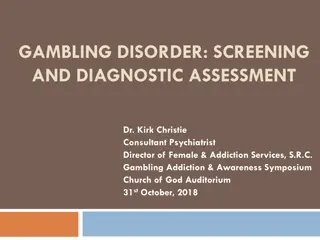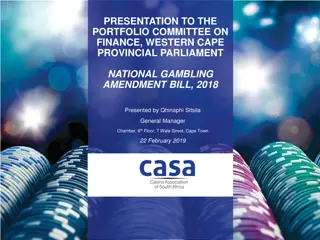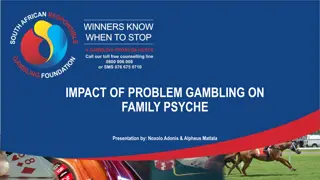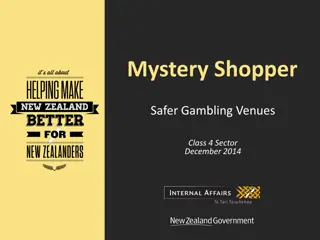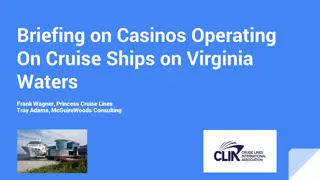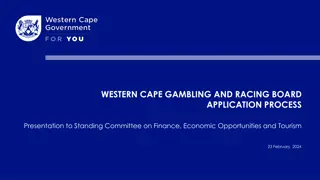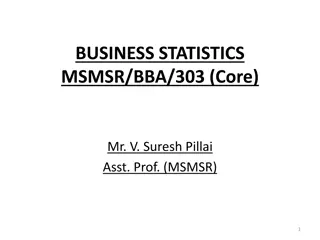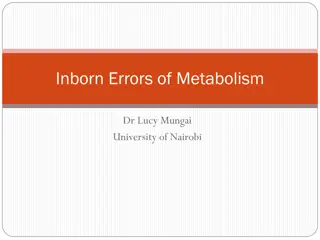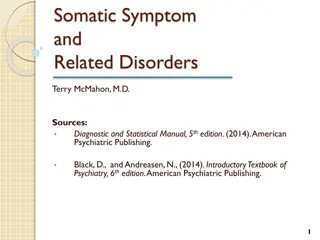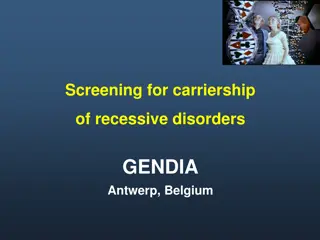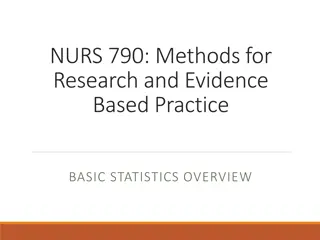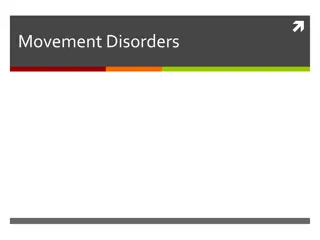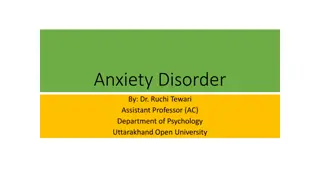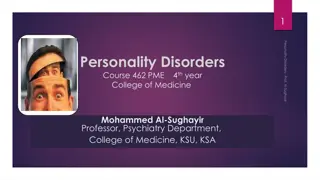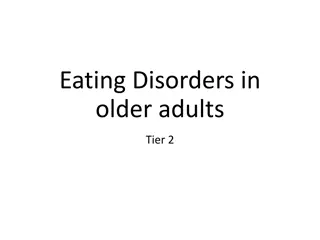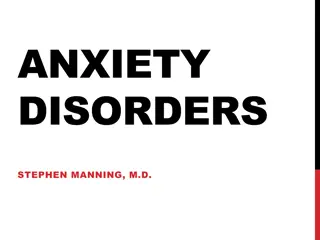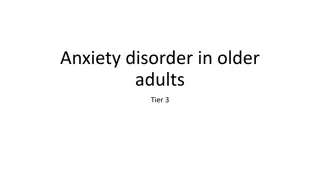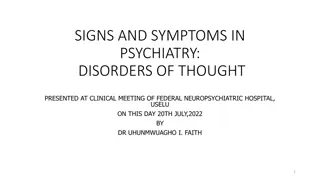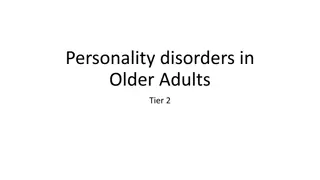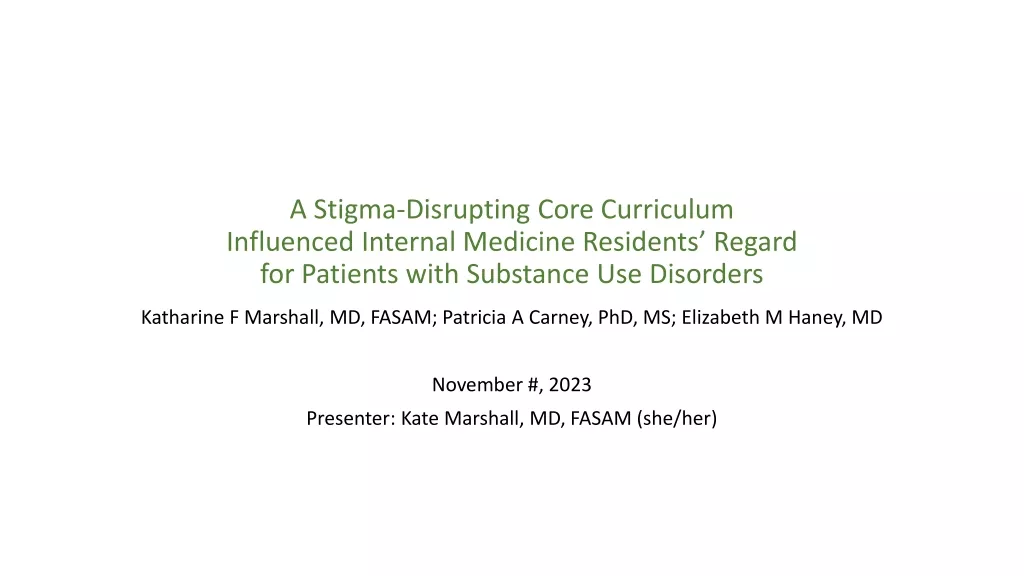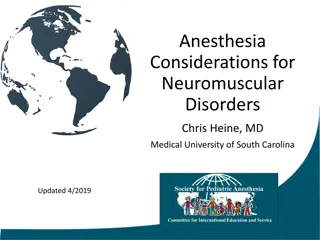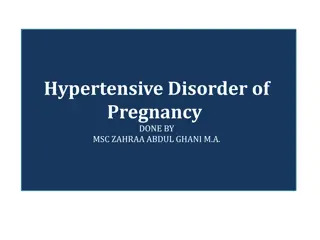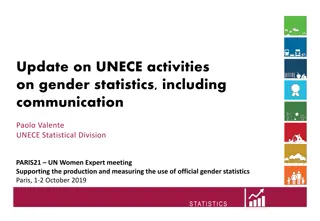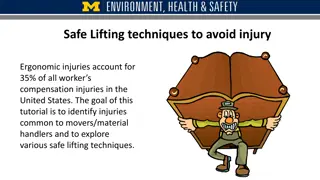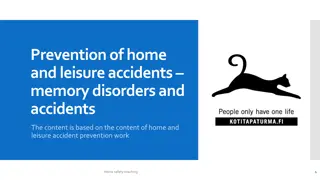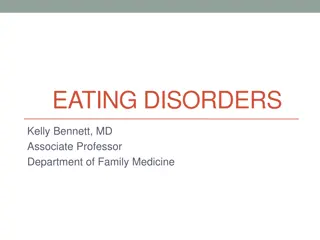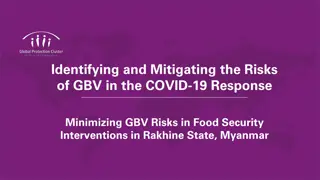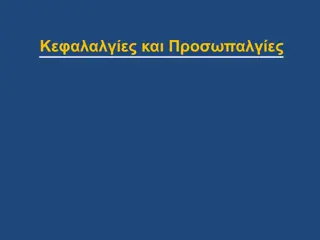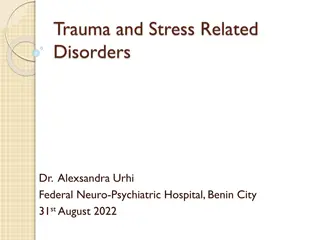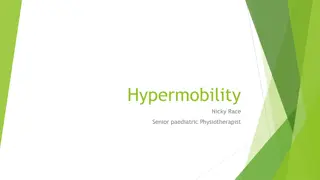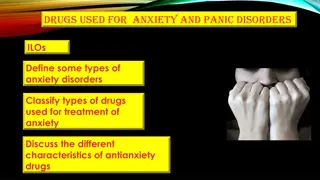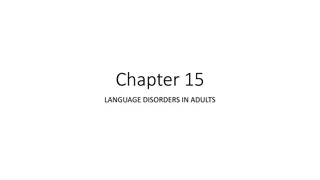Understanding Gambling Disorders: Risks, Criteria, and Statistics
This content delves into the complexities of gambling disorders, covering a range of behaviors, diagnostic criteria according to DSM-5, prevalence statistics in the U.S., and the growing global gambling industry. It highlights the spectrum of gambling behaviors, criteria for diagnosing gambling disorder, prevalence rates among U.S. adults and veterans, along with potential remission rates. Additionally, insights into the economic aspects of the gambling industry are provided, projecting its future growth trends.
- Gambling Disorders
- DSM-5 Criteria
- U.S. Gambling Statistics
- Global Gambling Industry
- Behavioral Health
Download Presentation

Please find below an Image/Link to download the presentation.
The content on the website is provided AS IS for your information and personal use only. It may not be sold, licensed, or shared on other websites without obtaining consent from the author. Download presentation by click this link. If you encounter any issues during the download, it is possible that the publisher has removed the file from their server.
E N D
Presentation Transcript
Gambling: Crossing the Line Shane W Kraus, Ph.D. Department of Psychology, UNLV Regis College November 10, 2021
Range of Gambling Behavior None Range of Behaviors Mild Moderate Severe Abstainer Recreational Gambling Disordered brief intensive Treatment HarmReduction Health Promotion
Show Me the Money! Casino-type table games Slot machines Scratch tickets Card games Lotteries Dice games Wagering Sports betting / E-sports Bingo Roulette Growing Gambling Industry: Forecasts, Technologies, and Trends. According to The Business Research Company, the global gambling market is expected to reach a value of around $565.4 billion, growing at an annual rate of 5.9% through 2022 3
DSM-5 Gambling Disorder Criteria Persistent and recurrent problematic gambling behavior leading to clinically significant impairment or distress as indicated by the individual exhibiting 4 (or more) of the following in a 12-month period: Increasing amounts of money to achieve desired excitement Restless/irritable when attempting to cut down or stop Repeated unsuccessful efforts to control, cut back, or stop Preoccupied with gambling Gambling when distressed Often returning another day to get even* Lying to conceal the extent of involvement with gambling Jeopardizing or losing relationship/job/educational opportunities Borrowing money 4
DSM-5 Gambling Disorder Criteria Specify if: Episodic: Meeting diagnostic criteria at more than one time point, with symptoms subsiding between periods of gambling disorder for at least several months. Persistent: Experiencing continuous symptoms, to meet diagnostic criteria for multiple years. Specify if: In early remission: After full criteria for gambling disorder were previously met, none of the criteria for gambling disorder have been met for at least 3 months but for less than 12 months. In sustained remission: After full criteria for gambling disorder were previously met, none of the criteria for gambling disorder have been met during a period of 12 months or longer. Specify current severity: Mild: 4 5 criteria met. Moderate: 6 7 criteria met. Severe: 8 9 criteria met.(APA, 2013) 5
Gambling Disorder Prevalence in U.S. Adults Up to 90% of U.S. adults gamble in their lifetime Lifetime problem gambling: 2-5% of U.S. adults 10% of U.S. veterans (see Etuk et al., 2020 for review) Lifetime gambling disorder: 6% college students 1-2% of U.S. adults 3% of U.S. veterans About 1/3 of problem gamblers experience natural remission (Slutske et al., 2012). 4.2% of US OEF/OIF/OND veterans exhibit at-risk/probable pathological gambling (Whiting et al., 2016) A US national survey of veterans found that 2.2% screened positive for at-risk/problem gambling (Stefanovics, Potenza, & Pietrzak, 2017) 6
Gambling among Women (vs. Men) Prevalence: Problem Gambling: 0.7% women vs. 2.7% men At-Risk Gambling: 5.6% women vs. 9.6% men Development (telescoping for women): Start later Progress faster Clinical Characteristics: Psychiatric & Substance Use Sensation-seeking for men 7
Gambling Problems in US Military Veterans (Etuk et al., 2020) 1. U.S. veterans have higher rates of gambling disorder compared with civilian populations (3 times higher than civilians). 2. Gambling disorder often co-occurs with trauma-related conditions, substance use, and suicidality, which may complicate treatment outcomes. 3. The lack of standardized screening for gambling problems among Veterans across U.S. federal agencies (e.g., Department of Defense, Department of Veterans Affairs) is concerning and remains a significant gap for ongoing prevention and treatment efforts. 8
Psychiatric Co-Occurring Disorders Individuals with gambling disorder have high rates of co-occurring disorders, including mood, personality, substance-use, and post-traumatic stress disorder (Kessler, Hwang, LaBrie et al., 2008; Petry, Stinson, & Grant, 2005). At-risk/problem gambling is associated with any personality disorders, particularly for cluster-B personality disorders (Ronzitti, Kraus, Hoff, Clerici, & Potenza, 2017). Veteran with problem gamblers seeking treatment report high rates of alcohol (77%), cocaine (43%), opioids (23%), and cannabis (16%) use disorders (Shirk, Kelly, Kraus et al., 2018)
Psychiatric Co-Occurring Disorders 40% of US veteran gamblers seeking treatment reported a previous suicide attempt (Kausch, 2003). Problematic levels of gaming and gambling was modest, with only 10.5% of the 466 problem gamblers also being problem video gamers and 24.1% of the 203 problem video gamers also being problem gamblers (Sander & Williams, 2019). About one-in-five men seeking treatment for compulsive sexual behavior disorder reported a lifetime history with gambling disorder (Kraus et al., 2015).
Risk Factors for Gambling Disorder History of an early big win (leading to false expectation of future wins) Cognitive distortions about the odds of winning (i.e., luck) Recent loss or change (e.g., divorce, job loss, retirement, bereavement) Self-esteem is tied to gambling wins or losses History of risk taking or impulsivity History of financial problems Depression Trauma history (Post traumatic stress disorder) Family history of gambling Substance use 11
Barriers to Help Seeking for Gambling Disorder Public funding for substance abuse treatment is 281 times greater than for problem gambling services ($17 billion vs. $60.6 million) (Marotta, 2013). ~ 11% of U.S. adults with gambling disorder seek professional help in their lifetime (Lister et al., 2015). A study of veterans with gambling disorder found that less than 5% had previously sought treatment (Shirk et al., 2018). High levels of stigma and shame among helping seeking clients 12
Cognitive Distortions (Fortune & Goodie, 2012) Representativeness: An event is judged likely to be drawn from a particular class, to the extent it resembles a typical member of that class. Gambler s Fallacy: When events generated by a random process have deviated from the population average in a short run (e.g., when a roulette ball has fallen on a red slot four consecutive times), individuals may erroneously believe that the opposite deviation (e.g., a black winner) becomes more likely Overconfidence: Phenomenon wherein individuals express a degree of confidence in their knowledge or ability Trends in Number Picking: Lottery players commonly try to apply long-run random patterns to short strings in their picks
Cognitive Distortions (Fortune & Goodie, 2012) Availability: An event is deemed more likely to occur if it is easier to recall from memory, or in other words is more available in memory. Illusory Correlations: Individuals believe that events they expect to be correlated, due to previous experiences. Availability of Others Wins: When reinforces the belief that they will win if they continue to play. individuals see and hear fellow gamblers winning Inherent Memory Bias: Individuals memory is biased to recollect wins with greater ease than losses. This interpretive bias allows gamblers to reframe their memories regarding gambling experiences in a way that focuses on positive experiences (wins) and disregards negative experiences (losses).
Screening for Gambling Disorder in Primary Care Assessed for gambling disorder among Veterans seeking mental health services in Primary Care Behavioral Health at the Bedford VAMC, Bedford, MA (funded by the Massachusetts Gaming Commission; Kraus, Potenza, et al., 2020). Used the Brief Biosocial Gambling Screen (Gebauer, LaBrie & Shaffer, 2010) to assess for problem gambling and used the DSM-5 criteria for diagnosing gambling disorder. Gambling behaviors were assessed during a routine, one-hour intake appointment for all new Veteran patients seeking mental health services in primary care. 260 Veterans were screened for gambling disorder between Nov 1, 2017, and Sept 15, 2018. 5% of patients reported at-risk/problem gambling. 15
icrg-bbgs-magnet2020.jpg Brief Biosocial Gambling Screen (BBGS) No/ Yes* Have you gambled in the past 12 months? 1. During the past 12 months, have you become restless irritable or anxious when trying to stop/cut down on gambling? No / Yes 2. or friends from knowing how much you gambled? 3. During the past 12 months, did you have such financial trouble as a result of your gambling that you had to get help with living expenses from family, friends or welfare? Any yes responses, suggestive of possible problem gambling. During the past 12 months, have you tried to keep your family No / Yes No / Yes (Gebauer et al., 2010) 16
Other Problem Gambling Screening Instruments National Opinion Research Center DSM-IV Screen (Gerstein et al., 1999) Massachusetts Gambling Screen (Shaffer et al., 1994) Problem Gambling Severity Index (PGSI) (Ferris & Wynne, 2001) Score higher than 8, indicative of problem gambling No risk, low-risk (1-2), moderate risk (3-7), and high-risk (8 or higher) 17
Treatments for Gambling Disorder Gambling disorder responds to similar treatments as substance use disorders. Recovery support services peer support & 12-step program (Gamblers Anonymous) Brief advice-giving/psychoeducation Cognitive behavioral therapies (Petry, Rash, & Alessi, 2016) Oral naltrexone (opioid antagonist) has shown efficacy in controlled trials (Bartely & Bloch, 2013). Veterans with gambling problems and alcohol use disorder had worst outcomes on medication (disulfiram or naltrexone) compared to Veterans with only alcohol use disorder (Grant, Potenza, Kraus & Petrakis, 2017) in terms of mental health functioning. Mindfulness based relapse prevention shown to be helpful for US veterans with co- morbid gambling and substances use or mental health challenges (Shirk et al., 2021). 18
Medications for Gambling Disorder Few randomized controlled trials have studied pharmacotherapies for gambling disorder. Opioid antagonists like naltrexone showed promise in the pharmacological treatment of gambling disorder. Pharmacotherapy combined with psychotherapy treatments for gambling disorder may provide better rates of patient retention in comparison to pharmacology-only treatments, though further research is needed in this area. Future studies should address gaps relating to considerations of racial, ethnic, gender and other individual differences in clinical studies (Kraus, Etuk, & Potenza, 2020). 19
Gambling Resources Veteran patients: VA Southern Nevada Healthcare System, Las Vegas, NV Las Vegas VA Residential Recovery and Renewal Center (LVR3) All patients: The National Problem Gambling Helpline, 1-800-522-4700, is available 24/7 and is 100% confidential. Massachusetts Problem Gambling Hotline: https://gamblinghelplinema.org/ Nevada resource locator: https://www.nevadacouncil.org/get-help-now/resource- locator/ Las Vegas: Robert Hunter Problem Gambling Treatment Center: https://gamblingproblems.org/ 20
Questions? Shane W. Kraus, Ph.D. Assistant Professor Director, UNLV Behavioral Addictions Lab Department of Psychology, University of Nevada, Las Vegas Adjunct Assistant Professor of Psychiatry UNLV School of Medicine shane.kraus@unlv.edu Lab: http://ba.sites.unlv.edu/ Office: 702-895-0214 21


